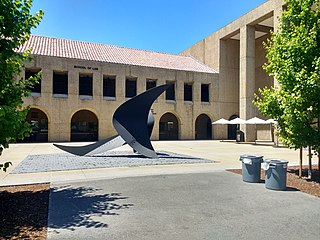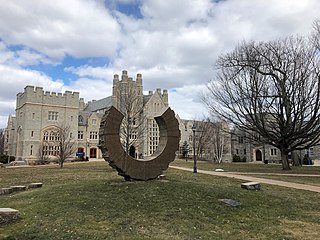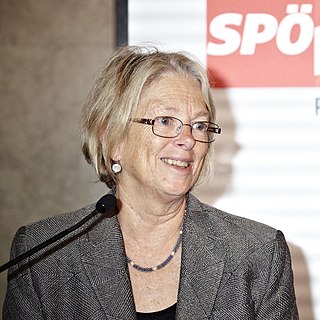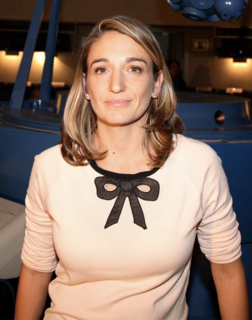Related Research Articles

Intellectual property (IP) is a category of property that includes intangible creations of the human intellect. There are many types of intellectual property, and some countries recognize more than others. The best-known types are copyrights, patents, trademarks, and trade secrets. The modern concept of intellectual property developed in England in the 17th and 18th centuries. The term "intellectual property" began to be used in the 19th century, though it was not until the late 20th century that intellectual property became commonplace in the majority of the world's legal systems.

Stanford Law School is the law school of Stanford University, a private research university near Palo Alto, California. Established in 1893, it is consistently regarded as one of the most prestigious law schools in the world. Stanford Law has been ranked among the top three law schools in the United States every year since 1992. Since 2019, Jennifer Martínez has served as its dean.

New York University School of Law is the law school of New York University, a private research university in New York City. Established in 1835, it is the oldest law school in New York City and the oldest surviving law school in New York State. Located in Greenwich Village in Lower Manhattan, NYU Law offers J.D., LL.M., and J.S.D. degrees in law.

The University of Connecticut School of Law is the law school associated with the University of Connecticut and located in Hartford, Connecticut. It is the only public law school in Connecticut and one of only four in New England. In 2020 it enrolled 488 JD students.

The University of Virginia School of Law is the law school of the University of Virginia, a public research university in Charlottesville, Virginia. It was founded in 1819 by Thomas Jefferson as part of his "academical village" which became University of Virginia where law was one of the original disciplines taught. UVA Law is the fourth-oldest active law school in the United States and the second-oldest continuously operating law school. The law school offers the J.D., LL.M., and S.J.D. degrees in law and hosts visiting scholars, visiting researchers and a number of legal research centers.

Pamela Samuelson is the Richard M. Sherman '74 Distinguished Professor of Law and Information Management at the University of California, Berkeley with a joint appointment in the UC Berkeley School of Information and Boalt Hall, the School of Law.

Rebecca Newberger Goldstein is an American philosopher, novelist, and public intellectual. She has written ten books, both fiction and non-fiction. She holds a Ph.D. in philosophy of science from Princeton University, and is sometimes grouped with novelists such as Richard Powers and Alan Lightman, who create fiction that is knowledgeable of, and sympathetic toward, science.
The DePaul University College of Law is the professional graduate law school of DePaul University in Chicago. The College of Law’s facilities encompass nine floors across two buildings, with features such as the Vincent G. Rinn Law Library and Leonard M. Ring Courtroom. The law school is located within two blocks of state and federal courts, as well as numerous law firms, corporations and government agencies.
Joseph P. Liu is a professor at Boston College Law School. He has published a number of papers and articles on the subjects of intellectual property law, law and the internet, and internet regulation.

Jessica Litman is a leading intellectual property scholar. She has been ranked as one of the most-cited U.S. law professors in the field of intellectual property/cyberlaw.
Albert Nijenhuis was a Dutch-American mathematician who specialized in differential geometry and the theory of deformations in algebra and geometry, and later worked in combinatorics.

The Information Society Project (ISP) at Yale Law School is an intellectual center studying the implications of the Internet and new information technologies for law and society. The ISP was founded in 1997 by Jack Balkin, Knight Professor of Constitutional Law and the First Amendment at Yale Law School. Jack Balkin is the director of the ISP.
Samuel Aaron Moyn is the Henry R. Luce Professor of Jurisprudence at Yale Law School and Professor of History at Yale University, which he joined in July 2017. Previously, he was a professor of history at Columbia University for thirteen years and a professor of history and of law at Harvard University for three years. His research interests are in modern European intellectual history, with special interests in France and Germany, political and legal thought, historical and critical theory, and Jewish studies.

Paul Goldstein is a law professor at Stanford Law School.
David Nimmer is an American lawyer, law professor, renowned as an expert in United States copyright law. He received an A.B. with distinction and honors in 1977 from Stanford University and his J.D. in 1980 from Yale Law School, where he served as editor of the Yale Law Journal. David Nimmer is of counsel to Irell & Manella LLP in Los Angeles, California. He also serves as a Professor from Practice at University of California, Los Angeles Law School and Distinguished Scholar at the Berkeley Center for Law and Technology. In 2000, he was elected to the American Law Institute. He has served as a guest professor at the University of Haifa, Yeshiva University, the University of Miami, and Syracuse University.

Edward J. Damich is an American lawyer serving as a Senior judge of the United States Court of Federal Claims. He served as the court's chief judge from 2002 to 2009.

Licia Verde is an Italian cosmologist and theoretical physicist and currently ICREA Professor of Physics and Astronomy at the University of Barcelona. Her research interests include large-scale structure, dark matter, dark energy, inflation and the cosmic microwave background.

Peking University Law School is the law school of Peking University, located in Haidian District, Beijing, China.

David Tan is a Singaporean law professor at the National University of Singapore Faculty of Law. He was the Vice Dean of Academic Affairs from January 2015 to June 2021. His legal scholarship covers intellectual and intangible property law. He is also a fine art and fashion photographer, with exhibitions presented by Cartier and Versace.
Asad Q. Ahmed is an American scholar who is the Magistretti Distinguished Professor of Middle Eastern Languages and Culture and Professor of Arabic and Islamic studies in the Department of Middle Eastern Languages and Cultures at the University of California, Berkeley. He is also the director of the Center for Middle Eastern Studies.
References
- ↑ "Steven Wilf – Yale Law School". law.yale.edu. Retrieved 2018-05-25.
- ↑ "NewsNet Issue 644 | U.S. Copyright Office". www.copyright.gov. Retrieved 2018-05-25.
- ↑ "Fellows, Current Theme, Center for the Humanities – Wesleyan University". www.wesleyan.edu. Retrieved 2018-05-25.
- ↑ http://www.law.uconn.edu/content/wilf-named-lemelson-fellow [ dead link ]
- ↑ http://www.law.uconn.edu/content/wilf, Archived 2013-01-11 at the Wayback Machine
- ↑ "Steven Wilf | Program in Law and Public Affairs | Princeton University". lapa.princeton.edu. Retrieved 2018-05-25.
- ↑ "Steven Wilf". Radcliffe Institute for Advanced Study at Harvard University. 2013-09-25. Retrieved 2018-05-25.